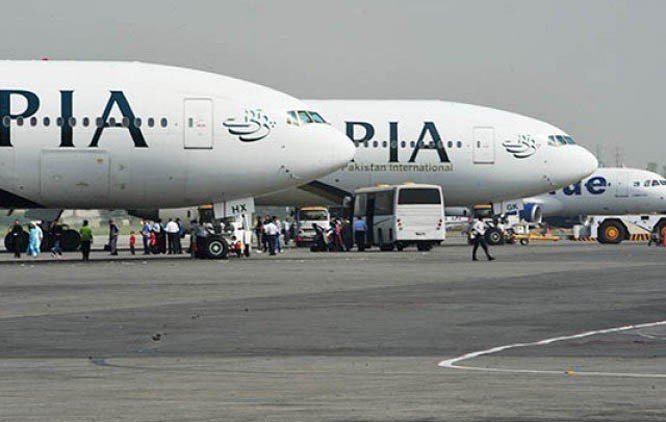
PIA is plagued with countless issues. Is there a solution to save it?

The national flag carrier Pakistan International Airlines (PIA) is in the news nowadays and once again mostly for the wrong reasons. The Safety Investigation Board’s (SIB) recent report terms lack of timely maintenance as the main cause of the crash near Havelian in 2016 that killed 48 passengers, including singer-turned-preacher Junaid Jamshed.
Also, 65 cabin crewmembers and 16 pilots have been suspended for possessing fake degrees and scrutiny of others is underway. Some of the suspended pilots, it has turned out,are not even matriculate.
If this is not worrying enough, it was revealed by acting CEO PIA Air Marshal (retd) Arshad Mehmood that the airline is facing a loss of Rs3 billion per month. Out of the 32 aircraft, only sixare generating revenue.
In the midst of such serious chaos, the PIA administration issued instructions to the PIA cabin crew to reduce their weight within six months or quit. The directive is reportedly meant to make the crew look attractive, agile and responsive.
Last week, PIA’s CEO held a press conference to share the airline’s five-year Strategic Business Plan 2019-2023. He talked about the closure of non-profitable routes, opening of profitable routes, financial restructuring with the support of the government, lease of new aircrafts, positive image-building of the airline, efforts to curtail non-productive activities of unions and so on. Interestingly, he shared, it has also been decided that onboard instrumental music would be replaced by religious recitals.
Is the new plan worthy of transforming the airline? There are grave reservations about it from certain quarters. Afsar Malik,a former official at the Civil Aviation Authority (CAA) and an expert in airline economics says nowhere in the world are state-owned airlines doing well. "Those who give the example of Middle Eastern airlines like Etihad, Emirates and Qatar must know these are owned by members of royal families. Besides, they employ the best human resource from all over the world, there is no overstaffing and even the slightest sign of inefficiency or misconduct may lead to termination of contracts."
He says PIA has been converted into a public limited company under an act of the parliament, "therefore it can be declared bankrupt".In that case,"huge liabilities such as those payable to government entities such as the Civil Aviation Authority (CAA), Federal Board of Revenue (FBR), Pakistan State Oil (PSO) and the National Bank of Pakistan (NBP) will not have to be settled and assets could be offered for sale".
However, he says, this is not acceptable to political parties "that have their affiliate labour unions in the airline, courts, media and other pressure groups that disapprove of any job losses in the aftermath of bankruptcy".
Malik suspects that employees in excess will be sent home and given salaries till they retire,"if they cannot be removed from their posts. By cutting on their fringe benefits and other operational costs, PIA could bring down its losses substantially."
So, where lies the solution? Malik has a suggestion --"Launch a private airline with government’s share not more than 26 percent so that it can limit itself to management and leave the business part to private sector players. The staff must be hired on a contractual basis and the continuity of job be linked to performance."
There are rumours that the government intends to retain Arshad Malik as permanent CEO. An advertisement that seems tailor-made to accommodate him has been placed in the press that requires the applicant to have done a war courseand education in aviation.
A source in the aviation division highlights the perennial issues that plague PIA and submits that privatisation of PIA is possible only if the process is kept transparent, which "till date has not been possible". There are many questions attached with privatisation, such as who will take the responsibility of the debts/losses, how and who will evaluate the worth of PIA and whether its assets will remain with PIA.
Experts in the aviation industry believe that for PIA to make a turnaround it will have to be owned by proud Pakistanis, staffed by happy and content employees, routes must be professionally utilised,flights must be frequent and punctual, cabin interiors must be immaculately maintained, and the entire travel experience must be a pleasure. More importantly, the fares must be competitive.
Afsar Malikwants PIA to go for aggressive marketing and launch regular direct flights to international destinations. "Emirates, Qatar Airways, Etihad Airways and Turkish Airlines offer daily flights from Pakistan, and take away the major market share."
PIA Spokesman Mashood Tajwar tells TNS that a detailed report on the Havelian crash is yet to come. "It is true that the blades of the aircraft needed a change after 10,000 hours as is the universal practice in aviation and this had not been done for the aircraft that crashed, but we were on the borderline,it had flown just a few miles extra. We will definitely look for real reasons behind the accident as passengers’ safety is our first priority."
He adds that some people are questioning the pilot’s intermediate degrees without knowing that this is the qualification required for entry into this profession. "As an employee of PIA, they then go on to acquire on-job training and further education."
Commenting on weight reduction orders to the cabin crew, he says,"there is nothing unusual about it. It’ll be good for the overall health of the cabin crew."